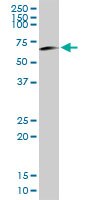CB1045 Sigma-AldrichAnti-OCLN Mouse pAb
This Anti-OCLN Mouse pAb is validated for use in Immunoblotting, Immunocytochemistry for the detection of OCLN.
More>> This Anti-OCLN Mouse pAb is validated for use in Immunoblotting, Immunocytochemistry for the detection of OCLN. Less<<Synonyms: Anti-Occludin
Recommended Products
Overview
| Replacement Information |
|---|
Key Spec Table
| Species Reactivity | Host | Antibody Type |
|---|---|---|
| H, M | M | Polyclonal Antibody |
| References |
|---|
| Product Information | |
|---|---|
| Form | Liquid |
| Formulation | In PBS, pH 7.2. |
| Negative control | 293T cells |
| Positive control | Human liver tissue, Mouse liver tissue, HeLa cells |
| Preservative | None |
| Biological Information | |
|---|---|
| Immunogen | Full-length, human OCLN (aa 1-522) |
| Immunogen | Human |
| Host | Mouse |
| Isotype | IgG |
| Species Reactivity |
|
| Antibody Type | Polyclonal Antibody |
| Physicochemical Information |
|---|
| Dimensions |
|---|
| Materials Information |
|---|
| Toxicological Information |
|---|
| Safety Information according to GHS |
|---|
| Safety Information |
|---|
| Product Usage Statements |
|---|
| Packaging Information |
|---|
| Transport Information |
|---|
| Supplemental Information |
|---|
| Specifications |
|---|
| Global Trade Item Number | |
|---|---|
| Catalogue Number | GTIN |
| CB1045 | 0 |
Documentation
Anti-OCLN Mouse pAb MSDS
| Title |
|---|










